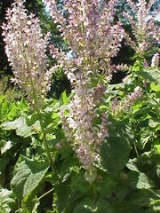
Clary
Encyclopedia
Salvia sclarea, clary, or clary sage, is a biennial
or short-lived herbaceous perennial in the genus Salvia
. It is native to the northern Mediterranean, along with some areas in north Africa and Central Asia
. The plant has a lengthy history as a medicinal herb, and is currently grown for its essential oil.
(4th century BCE), Dioscorides (1st century CE), and Pliny the Elder
(1st century CE).
Clary seeds have a mucilaginous
coat, which is why some old herbals recommended placing a seed into the eye of someone with a foreign object in it so that it could adhere to the object and make it easy to remove. This practice is noted by Nicholas Culpeper
in his Complete Herbal (1653), who referred to the plant as "clear-eye".
is used widely in perfumes and as a muscatel flavoring for vermouths, wines, and liqueurs. It is also used in aromatherapy
for relieving anxiety and fear, menstrual-related problems such as PMS and cramping, and helping with insomnia.
Biennial plant
A biennial plant is a flowering plant that takes two years to complete its biological lifecycle. In the first year the plant grows leaves, stems, and roots , then it enters a period of dormancy over the colder months. Usually the stem remains very short and the leaves are low to the ground, forming...
or short-lived herbaceous perennial in the genus Salvia
Salvia
Salvia is the largest genus of plants in the mint family, Lamiaceae, with approximately 700-900 species of shrubs, herbaceous perennials, and annuals. It is one of several genera commonly referred to as sage. When used without modifiers, sage generally refers to Salvia officinalis ; however, it is...
. It is native to the northern Mediterranean, along with some areas in north Africa and Central Asia
Central Asia
Central Asia is a core region of the Asian continent from the Caspian Sea in the west, China in the east, Afghanistan in the south, and Russia in the north...
. The plant has a lengthy history as a medicinal herb, and is currently grown for its essential oil.
Description
S. sclarea reaches 1 to 1.3 ft (0.3048 to 0.39624 m) in height, with square stems that are covered in hairs. The leaves are approximately 1 ft (0.3048 m) long at the base, 0.5 ft (0.1524 m) long higher on the plant. The upper leaf surface is rugose, and covered with glandular hairs. The flowers are in verticils, with 2-6 flowers in each verticil, and are held in large colorful bracts that range in color from pale mauve to lilac or white to pink with a pink mark on the edge. The lilac or pale blue corolla is approximately 1 in (2.5 cm), with the lips held wide open. The cultivar S. sclarea 'Turkestanica' bears pink stems, petiolate leaves, and white, pink-flecked blossoms on spikes to 30 inches tall (75 cm).History
Descriptions of medicinal use of the plant goes back to the writings of TheophrastusTheophrastus
Theophrastus , a Greek native of Eresos in Lesbos, was the successor to Aristotle in the Peripatetic school. He came to Athens at a young age, and initially studied in Plato's school. After Plato's death he attached himself to Aristotle. Aristotle bequeathed to Theophrastus his writings, and...
(4th century BCE), Dioscorides (1st century CE), and Pliny the Elder
Pliny the Elder
Gaius Plinius Secundus , better known as Pliny the Elder, was a Roman author, naturalist, and natural philosopher, as well as naval and army commander of the early Roman Empire, and personal friend of the emperor Vespasian...
(1st century CE).
Clary seeds have a mucilaginous
Mucilage
Mucilage is a thick, gluey substance produced by most plants and some microorganisms. It is a polar glycoprotein and an exopolysaccharide.It occurs in various parts of nearly all classes of plant, usually in relatively small percentages, and is frequently associated with other substances, such as...
coat, which is why some old herbals recommended placing a seed into the eye of someone with a foreign object in it so that it could adhere to the object and make it easy to remove. This practice is noted by Nicholas Culpeper
Nicholas Culpeper
Nicholas Culpeper was an English botanist, herbalist, physician, and astrologer. His published books include The English Physician and the Complete Herbal , which contain a rich store of pharmaceutical and herbal knowledge, and Astrological Judgement of Diseases from the Decumbiture of the Sick ,...
in his Complete Herbal (1653), who referred to the plant as "clear-eye".
Uses
The distilled essential oilEssential oil
An essential oil is a concentrated hydrophobic liquid containing volatile aroma compounds from plants. Essential oils are also known as volatile oils, ethereal oils or aetherolea, or simply as the "oil of" the plant from which they were extracted, such as oil of clove...
is used widely in perfumes and as a muscatel flavoring for vermouths, wines, and liqueurs. It is also used in aromatherapy
Aromatherapy
Aromatherapy is a form of alternative medicine that uses volatile plant materials, known as essential oils, and other aromatic compounds for the purpose of altering a person's mind, mood, cognitive function or health....
for relieving anxiety and fear, menstrual-related problems such as PMS and cramping, and helping with insomnia.

